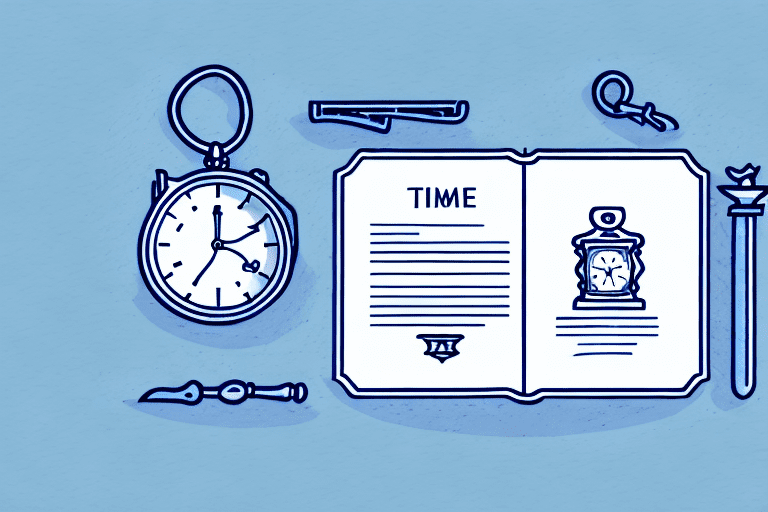Studying for the Patent Bar Exam is a significant undertaking that requires dedicated time and effort. How long it takes to prepare for the exam can vary depending on several factors. In this article, we will explore the various aspects of preparing for the Patent Bar Exam and provide insights into the average study time and effective study strategies to help you succeed.
Understanding the Patent Bar Exam
The Patent Bar Exam is a challenging test that assesses individuals’ knowledge and understanding of patent laws and regulations in the United States. It is administered by the United States Patent and Trademark Office (USPTO). Passing this exam is a requirement to become a registered patent attorney or agent.
When it comes to intellectual property, patents play a vital role in protecting inventions and innovations. The Patent Bar Exam serves as a gateway for individuals who wish to specialize in patent law and contribute to the field of intellectual property rights. It is a rigorous examination that evaluates candidates’ expertise in patent laws, rules, and procedures.
What is the Patent Bar Exam?
The Patent Bar Exam is a comprehensive assessment that evaluates candidates’ knowledge of patent laws, rules, and procedures. It consists of multiple-choice questions covering various aspects of patent law, including patent application and prosecution, patentability, and legal ethics.
During the exam, candidates are tested on their understanding of the patent application process, including the requirements for patentability, the different types of patents, and the procedures for filing and prosecuting patent applications. They are also evaluated on their knowledge of patent infringement, patent litigation, and the ethical responsibilities of patent attorneys and agents.
The exam is designed to ensure that individuals who pass possess a thorough understanding of patent laws and regulations, enabling them to provide competent and effective legal representation in patent-related matters.
Importance of the Patent Bar Exam
The Patent Bar Exam is essential for anyone aspiring to practice patent law. Passing the exam demonstrates a deep understanding of patent laws and regulations, which is crucial for effectively representing clients in patent-related matters.
By passing the Patent Bar Exam, individuals prove their competence and expertise in the field of patent law. This recognition not only enhances their professional credibility but also opens up various career opportunities. Registered patent attorneys and agents can work in law firms, corporations, government agencies, or as independent practitioners, assisting clients in securing patent rights and navigating the complex landscape of intellectual property laws.
Moreover, passing the Patent Bar Exam is a significant milestone for individuals who are passionate about innovation and technology. It allows them to contribute to the advancement of science and technology by protecting and promoting inventions through the patent system.
In conclusion, the Patent Bar Exam is a rigorous assessment that evaluates individuals’ knowledge and understanding of patent laws and regulations. It serves as a prerequisite for becoming a registered patent attorney or agent and plays a critical role in ensuring competent legal representation in patent-related matters.
Prerequisites for the Patent Bar Exam
Before delving into the study requirements, it is important to understand the prerequisites for taking the Patent Bar Exam.
The Patent Bar Exam is a rigorous examination that tests the knowledge and skills of individuals who wish to become registered patent attorneys or agents. It is administered by the United States Patent and Trademark Office (USPTO) and is a crucial step in the process of becoming a patent practitioner.
One of the key prerequisites for taking the Patent Bar Exam is meeting the educational requirements. To be eligible for the exam, candidates should have a technical or scientific background. This typically means holding a bachelor’s degree or higher in a recognized scientific or engineering discipline.
Having a technical or scientific background is essential because patent law deals with inventions and innovations in various fields such as chemistry, biology, computer science, and engineering. A solid foundation in these disciplines allows candidates to understand the technical aspects of patent applications and effectively communicate with inventors and examiners.
In addition to the educational requirements, candidates must possess the necessary experience and skills to handle patent-related matters. This includes a strong understanding of patent law principles, research abilities, and effective communication skills.
Having a deep understanding of patent law principles is crucial for success in the Patent Bar Exam. Candidates need to be familiar with the various statutes, regulations, and case law that govern the patent system. They must be able to analyze complex legal issues and apply the relevant legal principles to different factual scenarios.
Research abilities are also essential for patent practitioners. They need to be skilled in conducting thorough searches of prior art to determine the novelty and non-obviousness of an invention. This involves using various databases, search engines, and other resources to locate relevant patents, scientific articles, and other technical documents.
Effective communication skills are another important requirement for the Patent Bar Exam. Patent practitioners need to be able to draft clear and concise patent applications, respond to office actions from examiners, and argue for the patentability of their clients’ inventions. They must be able to convey complex technical and legal concepts in a manner that is understandable to both inventors and examiners.
In conclusion, the prerequisites for taking the Patent Bar Exam include having a technical or scientific background, possessing a strong understanding of patent law principles, having research abilities, and effective communication skills. Meeting these prerequisites is essential for success in the exam and for a career as a registered patent attorney or agent.
Time Investment for Studying
Preparing for the Patent Bar Exam requires a considerable time commitment. While the exact study time can vary, it is important to develop an understanding of the average study duration and the factors that may influence it.
Studying for the Patent Bar Exam is not a task to be taken lightly. It requires dedication, focus, and a significant investment of time. The journey to becoming a patent attorney is a challenging one, but the rewards are well worth it.
So, how much time should you expect to invest in studying for the Patent Bar Exam? The average study time for this exam ranges from 200 to 300 hours. This includes both self-study and utilizing study resources, such as review courses and practice exams. However, it is important to note that individual study times may differ based on various factors.
Average Study Time
The average study time for the Patent Bar Exam ranges from 200 to 300 hours. This includes both self-study and utilizing study resources, such as review courses and practice exams. However, individual study times may differ based on prior knowledge, study efficiency, and personal circumstances.
When it comes to studying for the Patent Bar Exam, there is no one-size-fits-all approach. Some individuals may be able to grasp the material quickly and efficiently, while others may require more time and effort to fully understand the concepts. It is important to assess your own strengths and weaknesses and tailor your study plan accordingly.
Additionally, the complexity of the patent law material can also impact the study time required. If you have a strong background in patent law or have prior experience in the field, you may find certain topics easier to grasp, thus reducing your overall study time. On the other hand, if you are new to the world of patents, you may need to allocate more time to fully comprehend the intricacies of the subject matter.
Factors Affecting Study Time
Several factors can impact the study time needed for the Patent Bar Exam. These include the candidate’s familiarity with patent law, prior experience in the field, and availability to dedicate consistent study hours. Other factors such as work commitments, family responsibilities, and time management skills also play a role in determining the study duration.
It is important to consider these factors when planning your study schedule. If you are already familiar with patent law or have prior experience in the field, you may be able to allocate less time to studying. However, if you have a demanding job or other personal commitments, you may need to set aside more dedicated study hours each week to ensure you cover all the necessary material.
Time management skills are also crucial when it comes to studying for the Patent Bar Exam. Being able to effectively prioritize your study time and eliminate distractions can greatly enhance your productivity. Creating a study schedule and sticking to it can help you stay on track and make the most of the time you have available.
Ultimately, the amount of time you invest in studying for the Patent Bar Exam will depend on a variety of factors. It is important to be realistic about your own abilities and circumstances, and to set aside sufficient time to adequately prepare for the exam. Remember, success on the Patent Bar Exam requires not only knowledge of the material, but also a commitment to putting in the necessary time and effort.
Effective Study Strategies for the Patent Bar Exam
Preparing for the Patent Bar Exam requires a strategic approach to ensure success. By implementing effective study strategies, you can optimize your preparation and increase the likelihood of passing the exam with flying colors.
Creating a Study Plan:
Developing a well-structured study plan is crucial for efficient preparation. It is recommended to divide your study time into manageable sessions, focusing on different topics each day. This approach allows you to cover a wide range of material while also preventing burnout.
When creating your study plan, consider the weightage of different topics in the exam syllabus. Allocate more time to areas that you find particularly challenging or that carry greater importance in the exam. By doing so, you can ensure that you have a solid understanding of all key concepts.
Utilizing Study Resources:
Take advantage of the various study resources available to enhance your preparation. The Patent Bar Exam is a comprehensive test, and utilizing these resources can provide valuable insights, clarify complex topics, and help you gauge your level of understanding.
Review Books:
Review books specifically designed for the Patent Bar Exam are a valuable resource. These books provide comprehensive coverage of the exam syllabus, including detailed explanations of key concepts and practice questions to reinforce your understanding.
Online Courses:
Online courses offer a flexible and interactive way to study for the Patent Bar Exam. These courses are often designed by experts in the field and provide in-depth explanations of complex topics. Additionally, they may offer practice quizzes and simulated exams to assess your progress.
Practice Exams:
Practice exams are an essential component of your preparation. They allow you to familiarize yourself with the format and structure of the actual exam. By regularly taking practice exams, you can identify your strengths and weaknesses, enabling you to focus on areas that require further improvement.
Study Groups:
Joining a study group can be highly beneficial as it provides an opportunity to collaborate with fellow exam takers. Discussing and debating patent law concepts with others can deepen your understanding and offer different perspectives. Additionally, study groups can provide a support system, motivating you to stay on track with your preparation.
In conclusion, effective study strategies are crucial for success in the Patent Bar Exam. By creating a well-structured study plan and utilizing various study resources, you can optimize your preparation and increase your chances of passing the exam. Remember to stay focused, dedicated, and consistent in your efforts, and success will be within reach.
Balancing Work, Life, and Study
Juggling study time with work and personal commitments can be challenging. However, with proper time management and effective strategies, it is possible to maintain a healthy work-life-study balance.
Managing Time Effectively
Allocate dedicated study hours throughout the week and stick to a consistent schedule. Prioritize tasks and avoid procrastination. Break study sessions into manageable chunks and take short breaks to recharge and maintain focus.
Maintaining Work-Life-Study Balance
Ensure you allocate time for personal activities, family, and relaxation. Setting boundaries and managing your workload effectively can help reduce stress and prevent burnout during your preparation.
In conclusion, the time required to study for the Patent Bar Exam varies depending on individual circumstances. By understanding the exam requirements, following effective study strategies, and maintaining a balanced approach, you can optimize your preparation time and increase your chances of success in the exam. Remember, consistent effort and dedication are key to achieving your goal of becoming a registered patent attorney or agent.











